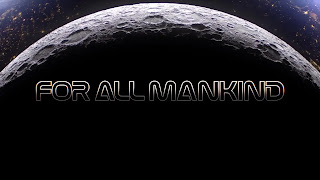If they were to engineer a television series in a lab that was targeted at me specifically, it's hard to imagine they could come up with something more precise than For All Mankind. It's 1) a narrative steeped in history (an alternative one), 2) about the Apollo moon program, and 3) co-created by Ronald Moore, creator of the Battlestar Galactica revival series and writer of many great episodes of Star Trek: The Next Generation and Star Trek: Deep Space Nine.
The jumping off point of For All Mankind is: "what if the Soviet Union landed the first human on the moon?" What if the space race never ended? What ripples in history, small and large, would result?
In its early episodes, the series is really all about these questions -- to a point where it's slow to get going with its characters and narrative. If you're a manned space flight geek (or, say, have recently watched the exceptional mini-series From the Earth to the Moon) and a lot of the details about how things actually happened in the Apollo program, then you'll enjoy all of this. The way the show weaves real-life figures in with its fictional characters is a lot of fun, and the writers really seem to go the extra mile in making their alternative history feel plausible: given X, then it really does feel like Y could happen.
But I was deliberate when I said that "Russians on the moon" was the jumping off point for the show. Once it sets the stage with its first few episodes, the series really pivots into character drama -- as you'd expect from a show run by Ronald Moore. The show delves deeply into the minds of the astronauts and the people who work at NASA, but also into the lives of their families. Episodes spend just as much time with the spouses of astronauts, and the season even dedicates a running slow burn subplot to a janitor in Houston who illegally came from Mexico in the hopes of providing a better life for his bright daughter.
For All Mankind is also a bittersweet show -- another characteristic you'll expect if you know the writing of Ronald Moore. Interestingly, the backdrop of this alternate history is largely positive. It quite frankly suggests that if Americans had lost the race to be first on the moon, our world would actually be a better one. But for the characters we follow, life is not always good. There's a lot of adversity and tragedy, and trying to rise above and carry on.
Among the listed main cast, there aren't many names and faces you're likely to know from other places. Joel Kinnaman is the most established among them, but he's hardly the show's "lead" despite being listed first in the credits. The series really does share the load evenly among half a dozen "main" characters. Plenty of recurring guest stars figure just as prominently too -- Chris Bauer (from True Blood) brings his trademark irascibility to the role of real-life figure Deke Slayton, recognizable "that guy" Wallace Langham gives good adversary as a more political operative in NASA, Nate Corddry is solid as an engineer with an important running subplot, and Sonya Walger (Penny from Lost) is great as uncompromisingly tough pilot Molly Cobb.
The one wrinkle here: this series is released on Apple TV+, a service not many I know have jumped onto. There are some shortcuts there, though; a year's subscription comes with an Apple TV device, and they've also made some of their programming (including this) available for free (temporarily?) in the age of Coronavirus. Any hurdles to watching the show, though, I recommend you jump... but, as I said, this show could scarcely be more "for me."
I give the first season of For All Mankind an A- overall. (The minus is acknowledgement that it is slow to get going at first.) I'm eagerly awaiting the second season.

No comments:
Post a Comment